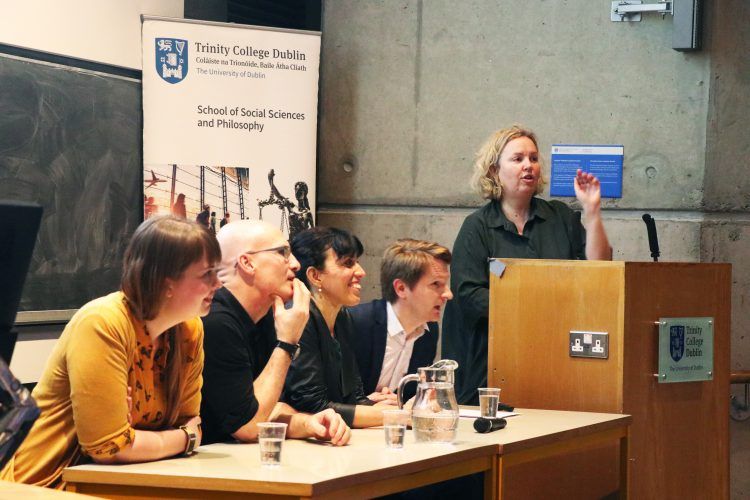The Breakdown of Trust in Society
Posted on: 01 March 2019
Trinity academics, with expertise in political institutions, ethics and health and well-being in societies, considered “The Breakdown of Trust in Society” at a thought-provoking public event hosted by the School of Social Sciences and Philosophy last week.
Trust can be the ‘glue’ that binds social groups together, as well as the ‘lubricant’ that helps people cooperate, even when they don’t know each other well. Societies with high levels of trust are generally richer and happier. But what is trust and can we differentiate it from trustworthiness?
Speakers considered an expansive range of topics examining questions such as is trust in political institutions on the decline? How much does media bias affect electoral outcomes? And how can we re-establish trust in circumstances where it has been lost?
Teaching Fellow Dr Elizabeth Ventham, a philosopher who specialises in ethics and moral psychology, got the evening’s proceedings underway. She discussed the problems we all face in understanding our own biases, motivations and character. Arguing that addressing our own flaws is an important step in understanding other people and that, in itself, is an important step towards re-establishing trust.

Head of the Department of Sociology, Professor Richard Layte examined the concerning divergence in trends in generalised trust – the sense that others in your society have a stake in society and will not seek to exploit you – between Scandinavian countries and the UK and the USA since the late 1970s. He considered some of the key drivers of this decline, surmising that the different social protection and marketization policy pathways adopted by these countries has had differential effects on trust.
“There is also a lack of trust coming from the fact that people don’t believe that their fellow citizens have a stake in society and that they have a lot to gain by cheating you. On the other hand you have a big portion of society who are indeed doing worse and they have come to believe that what matters more is making a profit and the market, this is a toxic mix which leads to a decrease in trust.”
“When societies lose social cohesion, when they lose social integration, it is bad for individuals as they tend to be sicker and unhappier. It is also bad for societies as they begin to break apart at the seams and fracture. Trust is essential but it is driven by policy choices and maybe that is the only silver lining.”
Assistant Professor in Economics, Dr Gaia Narciso focused on “Media bias and political consensus” considering the long-lived slant toward media tycoon and former Prime Minister Silvio Berlusconi in Italian political TV. She provided an insightful analysis of her research which compares the electoral outcome of Berlusconi’s party between municipalities that were exposed to the new digital channels, which had no ties to Berlusconi, with those which were still using analog technology. “The switch caused a drop in the Berlusconi coalition vote share by 5.5 to 7.5 percentage points, with at least 20% of digital users changing their voting behaviour after the switch-over. Interestingly the effect was stronger in towns with older and less educated voters which highlights the need to implement policies, to help individuals, and the most vulnerable demographics in particular, to filter out biases in information.”
In his talk on “Trust in Political Institutions in Eastern Europe” Assistant Professor in Political Science Dr Emanual Coman asserted that democracy forms a virtuous circle in which trust in institutions increases the value of democracy and in turn, people are more likely to trust institutions having experienced democratic order. Utilising Eurobarometer survey data (2004-2018) Dr Coman analysed the levels of trust in specific institutions and compared trust levels between Eastern and Western European countries. His findings indicated a higher level of trust in all institutions, except religious institutions, in the West. Trust in key democratic institutions, such as parties and parliaments, is declining in all countries and worryingly so in Eastern Europe..
Once the formal talks concluded Professor Linda Doyle, Dean of Research, chaired a lively and stimulating questions and answers session.
